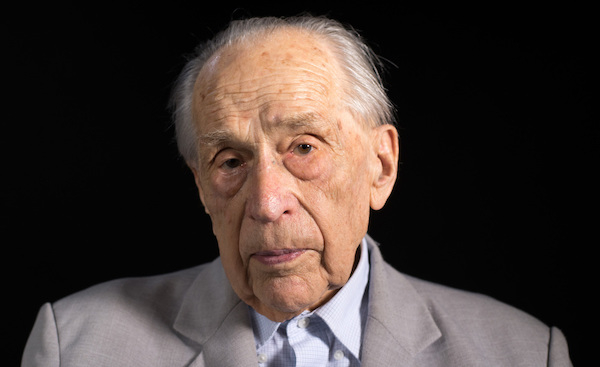Miloš Lokajíček‘s life journey was closely linked to the historical changes in the 20th century which influenced both his private and professional endeavours. He dedicated his life to developing physical sciences and disseminating Christian values and faith.

RNDr. Miloš Lokajíček, DrSc. (* 1923 †︎ 2019), Photo: Memory of nations
Miloš Lokajíček was born on August 20, 1923, in Starý Plzenec. In 1942 he graduated from grammar school in Pilsen, but he could not begin his university studies until the end of WW2. After the war, he applied to the re-established Faculty of Natural Sciences at Charles University, from which he graduated in 1948, majoring in mathematics and physics, and earning his doctoral degree two years later.
An unfavourable background check, which was motivated politically, prevented Lokajíček from taking up a job at the Mathematical Institute of the Škoda company in Pilsen but by the intercession of his brother-in-law he managed to get employed at the State Radiologic Institute in Prague and, later, participated in the implementation of new precise cancer treatment radiation techniques and in radiation oncology research at the Hospital Královské Vinohrady in Prague.
In 1952, together with professor Václav Votruba, they were the first researchers to propose the method of systematic description of elementary particles. In 1953, after a period of training in research at the Institute of Theoretical Physics at the Faculty of Natural Sciences at Charles University, he switched to a new job at the Institute of Physics of the Czechoslovak Academy of Sciences in Prague.
Lokajíček‘s scientific career was interrupted in February 1954 as he was arrested and subsequently sentenced to seven years imprisonment by the District Court in Prague. He was facing trial in the case "Malíková and others". This process was aimed against the circle of the "Family" in Prague led by a Croatian priest Stjepan Tomislav Kolaković, a group to which Lokajíček had belonged since 1946, while a year before he became one of the re-founders of the association of catholic and university students of the Czech Academic League.
Serving his sentence at a technical unit in Opava, he became responsible for a team translating documents about nuclear energy. Three years later, Lokajíček was pardoned and released from prison at a personal intervention from the president of Czechoslovakia Antonín Zápotocký as prompted by professor Votruba during their visit to the Joint Institute for Nuclear Researches in Dubno near Moscow, which became Votruba‘s next post in 1956 as a Deputy Director-General.
One year after his release, Lokajíček became involved with the development of nuclear devices for medical purposes at Tesla Přemyšlení. But it was not until the end of Prague Spring that he returned to his major discipline, and left for Dubna to do a one-year internship and, subsequently, returned to the Institute of Physics to become an informal head of the division of Elementary Particle Physics. In the 1990‘s he was actively involved in cooperation projects for the European Organisation for Nuclear Research (CERN).
Miloš Lokajíček dedicated all his life to developing physical sciences. His main research topic involved the description of particle collisions and decay processes and the quantum theory axiomatics. He was renowned for combining methods of seemingly different scientific disciplines and for adapting them to radiobiology and hadron therapy. Lokajíček was among the first scientists in Eastern Europe to introduce new accurate radiation techniques to cancer treatment. He authored and co-authored about 300 original scientific publications and was a holder of the Golden Plaque of the Czechoslovak Academy of Sciences for the merit and the development of physical sciences, awarded to him in 1992.
Lokajíček‘s personality and attitudes may be illustrated by Vojtěch Kundrát‘s memory published at the occasion of Lokajíček‘s jubilee at the website of the Institute of Physics. At the time of the Velvet Revolution in November 1989, a ceremony was held at the Joint Institute for Nuclear Research in Dubna, where Lokajíček gave the closing speech: "in his address he concentrated on the question of personal growth and on the position of an individual in society, pointing out that one, whether a scientist or not, should primarily be prepared to provide, not to pursue a career or personal goals.", recalls Kundrát in his text.
Miloš Lokajíček died on the 7th of November 2019, aged 96.
